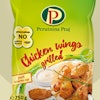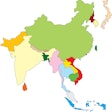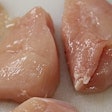Web exclusive by Dr. Terry Mabbett — "Where there's muck there's brass" is an old saying originating in the County of Yorkshire in northern England where "brass" is a slang word for money. The saying means there is always opportunity to cash in on waste, which poultry farmers across most of the United Kingdom are now doing with soiled litter. Used poultry litter is becoming a valuable commodity increasingly sought after by arable farmers for use as fertilizer with corresponding steep increases in market value.
In the past, poultry farmers were only too pleased when neighbouring arable farmers were prepared to come in and take the litter load away for free. But according to a report in Poultry World , used poultry litter has become an increasingly lucrative commodity commanding up to US$26 per tonne and rising. However, used poultry litter as manure for the land comes with strict health warnings. The warnings are not concerning disease, but potency of the nutrient-rich commodity that could harm crops and the environment if used inappropriately.
Broiler producer Stephen Hays of Bluemoon Farms at Ross-on-Wye, County of Gloucestershire (western England), told Poultry World he was once grateful for someone to take away his poultry manure, but now he’s selling it at S26/t. "In nutrient terms, more farmers have realised that it has a significant value. We are now charging for our manure, but we also need dependable people to take it and who abide by our system. We start emptying sheds at 6 a.m. and want loads taken away every 20 minutes. The efficiency with which we get the manure out of the sheds and off the farm is an important part of the process."
Poultry litter regulations must be followed
For poultry farmers faced with ever-tightening European Union (EU) controls on environmental contamination and pollution, quick disposal of their waste litter is a boon and being paid for the privilege is a bonus. The onus is now on the purchaser/farmer planning to spread the manure on his/her land to make sure no regulations are broken. Waste poultry litter used as a source of nutrients for crop production packs a powerful punch on par with straight fertiliser.
Poultry farmers with waste poultry litter to sell and arable farmers wanting to purchase must approach the business in a scientific manner. Otherwise, inappropriate use of nutrient-rich poultry litter on the land could breach EU regulations relating to Nitrate Vulnerability Zones and Integrated Pollution Prevention and Control (IPPC) regulations. Many poultry producers have traditionally run integrated farming operations so they are able to spread waste litter on their own land. They now have to be careful that they don’t break the rules and regulations either through inappropriate storage or application.
Safe application is key
Crop nutrition consultants claim that poultry manure offers nutrients at a fraction of the cost of fertilizer compounds and is virtually as good as the real thing. They say how poultry manure is potent, packing a powerful rapid punch due to composition and ready availability of the nutrients. And they warn how poultry producers and purchasers/users must be fully au fait with poultry litter analysis and the correct and safe way of application to the land. One nutrient consultant told Poultry World, "It's not just a case of plaster it on and hope for the best. Incorrectly applied manure can do more harm than good — not to mention the environmental implications."
Such are the potential dangers that local authorities are providing detailed guidance strategies covering the safe use of poultry manure on the land. Caradon District Council in the far south west of England in the County of Cornwall is warning producers not to store poultry manure between May and October, to spread within 24 hours of collection/delivery, and not to spread close to places where people live or work. It also advises ploughing in material within 24 hours and close inspection of treated land twice a week.
Litter a valuable commodity if used correctly
Poultry farmers clearly see their used litter as a valuable commodity, but also recognise that they and their purchasers have to comply with increasingly strict environmental regulations in their own locality. Stephen Hays at Bluemoon Farms told Poultry World how producers and purchasers must work together. He urges customers to work closely with an agronomist to understand the composition and behaviour of the waste material and how to achieve the correct spread-level and nutrient application.
Matrix Ag is a consultancy specialising in nutrient management warning users to be aware and on guard against the powerful nature of poultry manure. Owner Mark Tripney, who set up the business in Cheshire County (northwest England), told Poultry World, "Wider recognition of its nutrient value is good news for poultry producers, but we're talking about applying this material at the rate of 6 to 7 tonnes/hectare compared with 42 tonnes/hectare if we were working with farmyard manure."
Users should know what their soils need in terms of nitrogen, phosphorus, and potassium, and should have poultry manure analysed, Mark Tripney says. "Incorrect applications of poultry litter can quickly exceed nitrate vulnerable zone limits and can also cause potash toxicity in dairy cows grazing land that’s been treated. It's in the interest of poultry producers who want to develop a long-term market for their poultry manure to make sure buyers are well aware of the strength of this material. They must get themselves up to speed and have their litter analysed and provide a spec-sheet to prospective buyers. Poultry manure has very good value and provides a rich source of nutrients, but producers must act responsibly," says Mr. Tripney.
Manure a useful source of additional income
Similar sentiments were expressed by broiler producer Nigel Joice (Norfolk County, East Anglia) who is also vice-chairman of the National Farmers Union poultry meat committee. He says poultry manure is becoming a useful source of additional income and has undertaken a costing which quantifies the financial value his broiler litter.
Joice compares the nutrient value of poultry manure taken from one of his sheds with that of compound fertiliser. Based on fertiliser prices at the end of June 2008 showing nitrogen at $1.74/kg, phosphate at $2.60, potassium at $1.69, magnesium at $1.07, and sulphur at $0.45, the costing (undertaken by the England Catchment Sensitive Farming Delivery Initiative) showed the poultry manure gave a potential saving of $1,110/ha based on an application rate of 7.5t/ha. The total nutrient value of the manure was $622/ha. "We’ve been selling manure at $9/t but it will soon be going up to $17-$21/t although we also want to ensure we can get the material off the farm quickly. It's a very interesting development for the poultry sector, but users need to be fully aware of the strength of the material to ensure it’s used properly and responsibly," Joice told Poultry World.


















